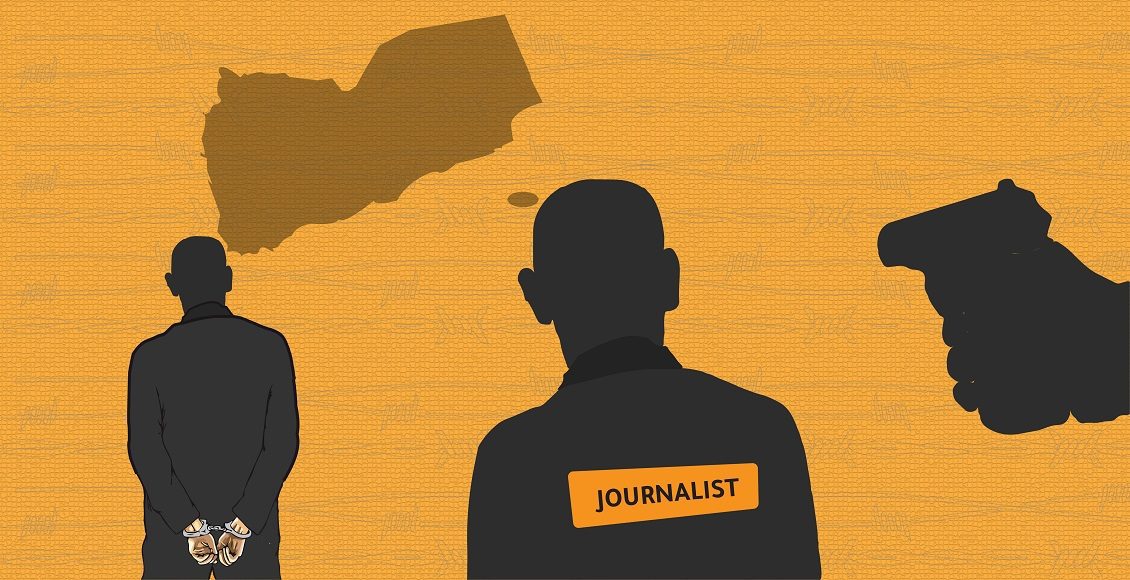 This image was designed by Salem Jameel, for the Free Media Center for Investigative Journalism
This image was designed by Salem Jameel, for the Free Media Center for Investigative Journalism
“Journalism Bleeding”: A report examines 100 violations against journalists in Yemen
Report context March 21, 2023
Under the title “Journalism bleeding”, as part of the efforts of media and human rights institutions in supporting the protection of rights and freedoms in Yemen and within the framework of the “Free Voices” project, the “Free Media Center for Investigative Journalism” issued a lengthy report documenting the top 100 violations against journalists amounting to war crimes, including 9 women, in three governorates: “Sana’a, Aden, Taiz”, during the period from 2015 to 2022. The report also focuses on examining the role of law enforcement institutions in cases of violations against journalists who work in a highly censored and repressive environment. Yemen ranks 169 out of 180 in “Reporters Without Borders” Press Freedom Index.
The report presents a disturbing picture of freedom of opinion and expression, which is under attack. It documented attacks on journalists in the targeted governorates since 2015, including killings, torture, enforced disappearances and arbitrary detention. And takes up the failure of the internationally recognized legitimate government and the de facto government in Sana’a to protect journalists and hold perpetrators of violations accountable. The Free Media Center for Investigative Journalism has not documented even a single case in which officials have prosecuted the perpetrator of an attack on a journalist or media outlet since 2015, except in three cases.
The report shows different types of violations and the responsibility of the conflicted parties in these violations. Where 52 journalists and human rights defenders were subjected to arbitrary detention, including (37) cases by entities affiliated with the Ansar Allah group (Houthis), (9) cases by entities affiliated with the internationally recognized legitimate government, (4) cases by forces affiliated with the Southern Transitional Council, (2) cases by an unidentified armed group in areas controlled by the internationally recognized legitimate government. In addition to 48 cases, ( 36) of them were forcibly disappeared by Ansar Allah group, (5) by the legitimate government, (5) by the Southern Transitional Council, and (2) by an unidentified group in areas controlled by the internationally recognized legitimate government.
The report documented the killing of 25 journalists since 2015, in the targeted governorates (Taiz, Sana’a, Aden), including 2 women, 9 journalists in Aden, 11 journalists in Taiz governorate and 5 journalists in Sana’a governorate. In all cases, those responsible and masterminds of the killings remain unaccountable, except in 3 cases, in which they were referred to trial. Verdicts were issued in two of them, such as the case of Abdul Karim Al-Khaiwani, where the court sentenced to death the 7 killers, allegedly belonging to the “Qaida”. In the case of activist and blogger Omar Bataweel, the Sira Court of First Instance in Aden convicted one of the defendants and sentenced him six years in prison, and in the case of the murder of journalist Fawaz Al-Wafi in Taiz, the defendants were brought to trial. Meanwhile, the West Sana’a Prosecution closed the case file of the murder (assassination) of investigative journalist Mohammed Abdo al-Absi.
According to the report, the Ansar Allah group (Houthis) is at the front of the parties responsible for killing journalists. The evidence contained in the report indicates the involvement of the Ansar Allah group (Houthis) in killing 10 journalists in the three targeted governorates, 2 in Aden governorate, and 8 in Taiz governorate, in addition to allegations that they were behind the assassination of journalist Mohammed Al-Absi in Sana’a.
The report also documented that the Saudi-led Arab coalition was responsible for the deaths of three journalists in airstrikes in Sanaa in the north of the country.
In Aden, the governorate under the control of the internationally recognized legitimate government run by the UAE-backed Southern Transitional Council (STC), among nine cases of journalist killings, 7 journalists were killed by unidentified parties, but the STC component appears to be complicit in the killers of at least two activists, shot by extremists, blogger Omar Bataweel and civil activist Amjad Abdulrahman.
According to the report, the proceedings in 8 murder cases stopped at the stage of collecting evidence, and the security services in Aden had been able to arrest some suspects in the killing of journalist Rasha Al-Harazi, and one of these defendants tried to commit suicide in prison, while the main defendant managed to escape to the areas controlled by the Ansar Allah group (Houthis), according to the testimony of the security services.
The security services in Aden were also able to arrest a person suspected of participating in the assassination of journalist Saber Al-Haidari. According to the report, this person was the last to accompany the journalist Al-Haidari a few hours before the explosion. The suspect (M.A.) was interrogated by the Criminal Investigation Department in Aden, and it turned out that he had pictures of the residences of government officials, and journalists (including Al-Haidari). The detectives described this person as dangerous. The report stated that there was a lot of pressure from “unnamed” parties to release the detained person.
In Taiz, which is under the control of the internationally recognized legitimate government, 11 journalists were killed, 8 of them by the Ansar Allah group (Houthis), and in two cases the identity of the perpetrators was not identified. While in one case of investigations indicated that a journalist was killed as a result of a dispute and an officer belonging to the military axis was accused of the killing. Only two cases were investigated, the first was the case of journalist Mohammed Al-Tahiri, where the investigation procedures were suspended in the Criminal Investigation Department. The second was the case of journalist Fawaz Al-Wafi, in which the accuse of murder was brought to trial.
Law enforcement institutions
In its second part, the report tracked the role of law enforcement institutions “security and military agencies, prosecutions and courts” in dealing with journalists’ cases. It stated that the security and military agencies, whether those affiliated with the internationally recognized legitimate government, or those affiliated with the Ansar Allah group “Houthis”, have turned into tools to suppress journalists, according to information and testimonies documented in the report.
The report stated that the role of ordinary public prosecutions has forced to be absent, in order to weaken the independence of the judiciary and disrupt accountability mechanisms for perpetrators of human rights violations. The specialized criminal prosecutions have been replaced as an alternative, to become a tool of repression of opponents, especially journalists, who have become the common enemy of the conflicted parties in Yemen.
The report pointed to the absence of the role of prosecutors in supervising and inspecting detention centers and prisons, reviewing the integrity of procedures and the legality of detention, and referring detainees to the prosecution within the period specified by law, which made detainees vulnerable to torture and forcibly disappearance. In addition to the failure to respect the obligations imposed by the law on the Attorney General and the heads of prosecutions who refused to respond to the complaints submitted by the victim journalists or their lawyers appealing the arbitrary detention and requesting an investigation of ill-treatment and torture to confirm their allegations. As the Specialized Criminal Prosecution in Sana’a rejected requests to appeal the legality of the detention of 17 journalists and ignored requests to release arbitrarily held detainees. The Specialized Criminal Prosecution also issued vexatious accusing sentences against 16 journalists, based on confessions contained in the evidence collection reports taken under torture and during the period of forcibly disappearance.
The report stated that the specialized criminal courts have replaced the ordinary courts in hearing the cases of journalists who have been subjected to violations by the conflicted parties in Yemen. Despite the fact that all the alleged charges against the journalists do not fall within the jurisdiction of the specialized criminal courts.
The report clarified that within 17 cases examined in the report, it was found that in all of them the courts in which journalists were tried did not take constitutional and legal violations in consideration , such as confessions extracted under torture. Most of the accused journalists who deny the charges against them are convicted on the basis of their confessions under duress and were not supported by evidence. Prosecutors and the court have also repeatedly neglected(… observing obligations under international and national law that courts must ensure fair investigations into any allegations of arbitrary detention, forcibly disappearance, torture or ill-treatment, and that a confession can only be admitted as evidence in the case after a serious investigation finds the torture allegations were false.
The report also indicated that mock trial sessions were held where pleading was not conducted and the defendants were not allowed to get lawyers assistance .In 16 cases of journalists trials in Sana’a, defense lawyers were prevented to attend most sessions, and the court refused to allow lawyers to access case files. They only had a few minutes to prepare pleadings and in some cases 24 hours, which means that they were unable to appeal the legality of the arrest or adequate defense preparation before and during the trial.
Courts in Sana’a have also deliberately issued malicious and political sentences , which reduce the right of defendants to be considered innocent until proven guilty.
According to the report, the weakening of the capacity of the judiciary leads to the lack of accountability for those involved in serious violations against journalists, including torture, unlawful killings and long-term arbitrary detention, and forcibly disappearance. The failure of courts to investigate these violations contributes to an atmosphere of impunity, continues human rights violations, and undermines the important role of the press in holding governments and other powerful parties accountable for their actions. Without accountability for these crimes, journalists may be prevented from covering important issues. The public may be deprived of vital information, which leads to erode transparency, accountability, and ultimately democracy.
You can download the report in Arabic here, or in English from here.

